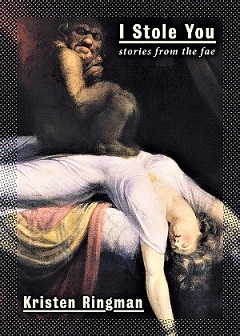by
Kristen Ringman
(Handtype Press, June 2017, pb, 108 pp.)
Reviewed by Nicky Magas
They’re all around us, the unseen, the mysterious, the fae. They watch, they stalk, and they love. They steal our hearts, our souls, and our bodies. They are selfish and egalitarian. They are reflections of ourselves. They are everywhere, and they are hungry.
Kristen Ringman presents fourteen short stories of love and consumption in her collection, I Stole You. Each story, told from the perspective of a fae from a different part of the world, tells the tale of the end of a human life. From mournful forest nymphs to vampires to enchanted dogs, Ringman takes readers into a new world and new lives with each story.
The central theme of the collection is life on the outside. Many of Ringman’s characters are deaf or have had exposure to the world of deafness. Ringman brings the isolation of that situation to life in the remote settings of her stories and the deeply personal nature of loss, suicide, and internal exploration. It is hard for readers who have never experienced deafness to truly understand the bubble of remoteness that deafness creates, but Ringman does a great job of expressing the concept in ways that are easily accessible to readers, bringing them more fully into the world she wishes to represent.
In spite of their shortness, the stories are beautifully written. Many of them present as little more than vignettes of a brief encounter between human and fae, and the lyrical style Ringman chooses throughout the collection, coupled with the serene outdoor setting of most of the stories, brings a sense of calm to the book no matter how dark the subject matter gets.
Ringman knits the collection together with a consistent first person fae perspective, beginning each story with the phrase, “I stole you.” This gives the collection cohesion and combined with the lyrical style, a sense of the poetic. Unfortunately, taken strictly as fantasy prose, this decision actually does a bit of a disservice to each individual story. Although the stories themselves are varied in content and setting, the narrative voices remain more or less indistinguishable from one story to the next. What gives the collection as a whole uniqueness and cohesion robs the individual stories of flavor. This is especially disappointing in the context of the rich and varied cultural backgrounds from which the stories are told.
The short length of the stories likewise restricts the amount of space to tell a story with fully rounded characters. Shortcuts are taken to have characters automatically understand each other either in language or context or both. With few exceptions, there is little tension in each story, and one tends to placidly bleed into another. After reading the first few stories, it’s fairly intuitive to figure out how the rest will play out.
It is therefore best recommended that readers walk into this book expecting literary prose. The short, highly stylized stories are forgivably experimental in this light and leave readers with a pleasant sense of the serene.
 I Stole You:
I Stole You: